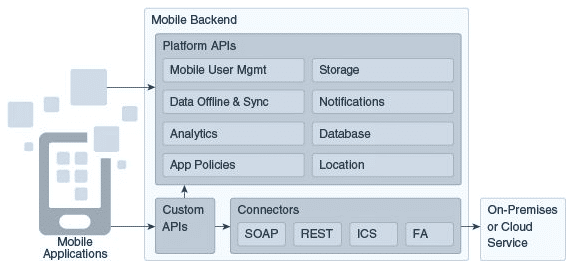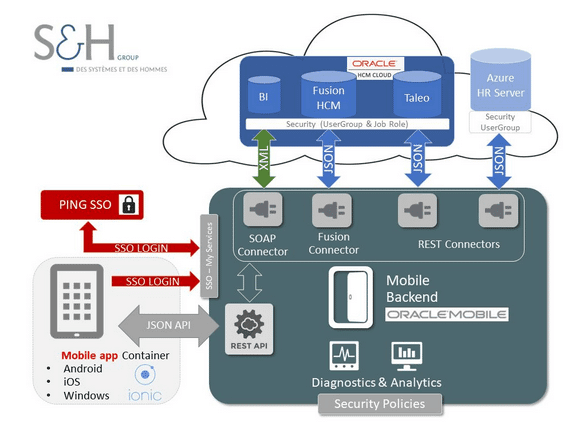What is MCS?
Released in 2015, Oracle MCS(Mobile Cloud Service) is a cloud PaaS solution facilitating backend management for mobile applications, both native and hybrid.
We can thus speak of MBaaS, or Mobile Backend as a Service. The range of functions is extensive, covering all aspects of the connection process between the mobile application and the company’s servers or other cloud services.
This ranges from user management, to the implementation of REST APIs, to the security of exchanges, to data analysis and storage, etc.
Why use MCS?
With this diversity of uses, MCS actually addresses several types of profiles involved in the realization of a project, not just technical ones as one might think:
- Mobile developer: selects from API platforms and works to design custom APIs
- Services developer: implements the backend in Node.js (Javascript) with Connectors and Custom APIs
- Enterprise architect: manages data provenance, users, security policies, roles and permissions
- Mobile project manager: uses the Analytics section to determine application usage patterns and statistics.
- Administrator: uses the
- Administration and Diagnostics to control the activity of production services

What kind of application for MCS?
Oracle offers an SDK (Software Development Kit) for native applications for each platform: Android, iOS, Windows Phone. Hybrid applications are not forgotten, with a JavaScript SDK that makes MCS usable on Cordova or Oracle JET.
These SDKs provide a set of objects and methods to connect the application to MCS and to use the proposed functions, such as connection to a mobile backend, authentication, requests to APIs, etc.
Customer use cases
As part of one of our customers’ HRIS overhaul project, SQORUS proposed to develop a mobile application to meet the needs of directors and managers.
This is a group HR directory giving access to employee profiles (personal and professional information, LTI, career plan, succession plan, etc.) and graphs on customer-defined KPIs.
The architecture was divided as follows:
- Client-side application (hybrid developed under Ionic 2)
- Oracle MCS mobile backend
- Microsoft Azure server for on-form data access
The figure below shows the organization of the different components involved in the project architecture. The mobile application communicates with MCS via REST APIs developed in Javascript.
These APIs then link to connectors that can call external services (Oracle cloud, customer’s dedicated servers, etc). MCS allowed us to associate our customer’s SSO and to provision users very quickly, replicating the existing security. In this way, the scope of each account is respected, so that no one is presented with data that should not be accessible to them.
The monitoring part allowed us to follow the adoption and use of the application over time. Thanks to the event log, we were also able to identify usage scenarios and queries that could fail.

The future with MCE (Mobile Cloud Enterprise)
Mobile Cloud Enterprise is a complete Cloud platform for Web, Mobile and Bots.
With MCS, Oracle is tackling a market where 3 big names generally stand out: Amazon AWS Mobile Hub, Microsoft Azure Mobile Apps and Google Cloud Platform.
These platforms offer very similar features. They differ in terms of ease of use and support, performance for each application and pricing.
Oracle has set up a YouTube channel dedicated to MCS, including a series of videos explaining the principles of operation as well as the actual implementation…
All about IT project governance
Discover the roles and responsibilities of key profiles, as well as best practices in governance and technological development, to ensure the success of your digital transformation projects.
Also read in our "IT project governance" file:
- Lowcode platform: the future of application development?
- The use of UIPATH as an RPA solution
- Project comitology: the governance bodies of an IT project and their roles
- Steering and governance of a Finance IS project: which profiles should be involved?
- Steering and governance of an IT project: which profiles should be involved?
- Project governance: what role for the steering committee?
- The actors of a project team: organization, role and skills
- The IS manager at the heart of the development and evolution of systems
- HRIS Manager: what role in the evolution of HR Information Systems?
- IS project manager: what role and responsibility in an IS project?
- Functional consultant: a role close to the business processes
- Technical consultant: a profession at the heart of technological development
- Solution architect: a profession that manages development and deployment
- DevOps Consultant: role, missions and development skills
- Data Protection Officer (DPO): what roles and missions?
- CISO: a key job within the business for system security
- The service delivery manager at the heart of team management
- Scrum master, a key profession for Scrum project management
- Data scientist: a strategic profession at the service of management
- MOA / MOE: how are the roles divided on a project of implementation of an information system?
Contact
A project? A request?A question?
Contact us today and find out how we can work together to make your company’s digital future a reality.




